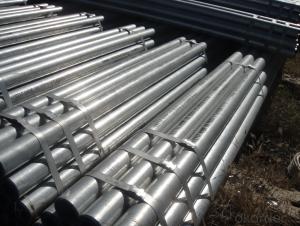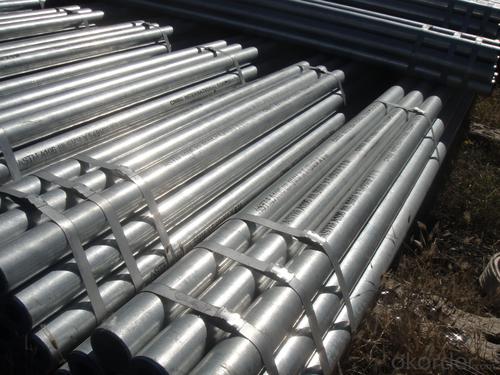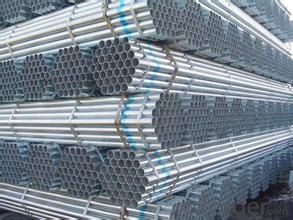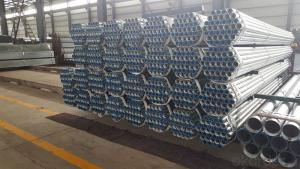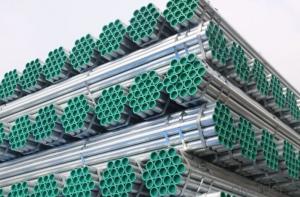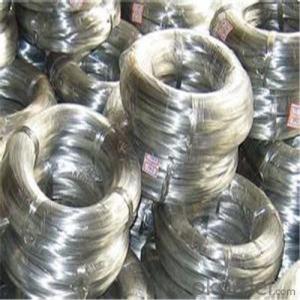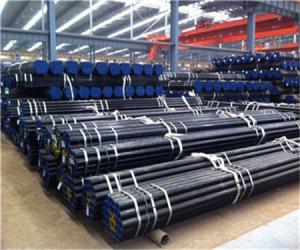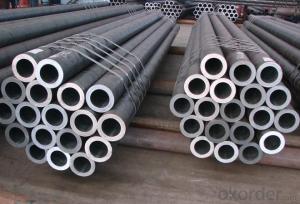Galvanized Steel Pipe with High Quality and Low Price
- Loading Port:
- China Main Port
- Payment Terms:
- TT or LC
- Min Order Qty:
- -
- Supply Capability:
- -
OKorder Service Pledge
OKorder Financial Service
You Might Also Like
SpecificationsHOT-DIP GALVANIZED PIPE FOR FLUID TRANSPORTATION
Galvanized Round Steel Pipe's Materials
| |||||||||||||||||||||||||||||||||||||||||||||||||||||||||||||||||||||||||||||||||||||||||||||||||||||||||||||||||||||||||||
FAQ of Galvanized Round Steel Pipe
①How is the quality of your products?
Our products are manufactured strictly according to national and internaional standard.Guaranteed: If products’ quality don’t accord to discription as we give or the promise before you place order, we promise 100% refund.
②How about price?
Yes, we are factory and be able to give you lowest price below market one, and we have a policy that “ for saving time and absolutely honest business attitude, we quote as lowest as possible for any customer, and discount can be given according to quantity.
③Why should you chose us?
Chose happens because of quality, then price, We can give you both.Additionally, we can also offer professional products inquiry, products knowledge train(for agents), smooth goods delivery, exellent customer solution proposals.Our service formula: good quality+good price+good service=customer’s trust
SGS test is available, customer inspection before shipping is welcome, third party inspection is no problem.
Galvanized Round Steel Pipe Image
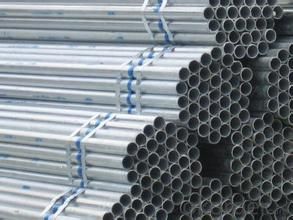
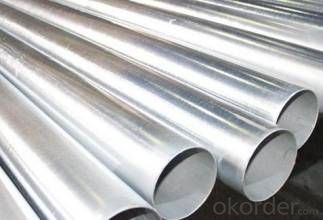
- Q: How do steel pipes handle high-pressure applications?
- Steel pipes are able to handle high-pressure applications due to their inherent strength and durability. They have a high tensile strength and are resistant to deformation under extreme pressure. Additionally, the seamless construction of steel pipes ensures that there are no weak points or joints that can compromise their ability to handle high pressures.
- Q: How to identify stainless steel pipe and steel pipe?
- The welded pipe is rolled into the steel tubular to sew or spiral seam welded in the manufacturing method, and is divided into low pressure fluid delivery with welded steel pipe, spiral welded steel pipe, welded steel pipe, welded pipe roll etc.. Seamless steel pipe can be used in various industries, such as liquid, pneumatic, pipeline and gas pipeline. Welding pipes can be used in water pipelines, gas pipelines, heating pipes, electrical appliances, pipelines and so on.
- Q: Can steel pipes be used for water supply systems?
- Yes, steel pipes can be used for water supply systems. Steel pipes are commonly used in water distribution systems due to their strength, durability, and resistance to corrosion. However, it is important to ensure that the steel pipes are properly coated or lined to prevent rusting and contamination of the water supply. Regular maintenance and inspection are also crucial to ensure the longevity and safety of steel pipes in water supply systems.
- Q: Are steel pipes resistant to vibration?
- Yes, steel pipes are generally resistant to vibration due to their high strength and rigidity.
- Q: Can steel pipes be used for transporting liquids and gases?
- Indeed, both liquids and gases can be transported using steel pipes. Renowned for their durability, strength, and resistance to corrosion, steel pipes are highly appropriate for various purposes, including the conveyance of fluids and gases. Industries like oil and gas, water supply, sewage systems, and chemical processing plants frequently employ steel pipes due to their reliability and efficiency in transporting liquids and gases across extensive distances. As a result, the transportation of these substances is accomplished securely and efficiently with the aid of steel pipes.
- Q: What's the difference between the fastener type steel pipe scaffold, the floor type steel pipe scaffold and the overhanging type steel pipe scaffold?
- Butt fastener: used for connecting two steel pipe joints.The base and the pad: is set up in the bottom of the pedestal pole, pay attention to the distinction between base and the base plate, usually with steel plate and welded steel pipe, base usually put on a backing plate, and the plate can be wood can also be plate.The foot board (see the diagram below), safety net (no explanation, this is very simple).
- Q: What is a steel pipe?
- A steel pipe is a cylindrical hollow tube made primarily of steel, commonly used for transferring fluids and gases, as well as structural applications in construction and industrial settings.
- Q: Can steel pipes be used for underground gas storage?
- Yes, steel pipes can be used for underground gas storage. Steel pipes are commonly used for transporting and storing various types of gases, including natural gas, due to their strength, durability, and resistance to corrosion. They are able to withstand high pressures and can be designed to meet the specific requirements of underground gas storage facilities. Additionally, steel pipes can be coated or lined with materials to further enhance their resistance to corrosion and to prevent any potential leaks. However, it is important to ensure that proper safety measures and regulations are followed during the construction and operation of underground gas storage facilities to prevent any potential risks or hazards.
- Q: How are steel pipes used in the construction of wind farms?
- Steel pipes are commonly used in the construction of wind farms to support and secure the wind turbines. These pipes serve as the foundation for the turbines, providing stability and structural integrity. They are used to create the tower structure, which supports the nacelle and rotor blades. Additionally, steel pipes are used for transporting and distributing the electrical cables within the wind farm, ensuring efficient transmission of electricity generated by the turbines.
- Q: What are the different grades of steel used in manufacturing pipes?
- There are several grades of steel used in manufacturing pipes, including carbon steel, alloy steel, stainless steel, and duplex steel. Each grade has distinct properties and characteristics that make it suitable for different applications and environments.
Send your message to us
Galvanized Steel Pipe with High Quality and Low Price
- Loading Port:
- China Main Port
- Payment Terms:
- TT or LC
- Min Order Qty:
- -
- Supply Capability:
- -
OKorder Service Pledge
OKorder Financial Service
Similar products
Hot products
Hot Searches
Related keywords
